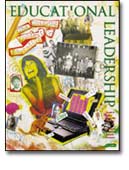"How does it make you feel that most people don't consider teachers to be successful?" one of my graduating seniors recently asked me.
"Well," I replied, "it depends on how you measure success." People usually use power and wealth as the yardsticks to measure achievement. But I believe that achievement can also be measured by the degree to which you find contentment in your occupation, contribute to society, and influence the minds and hearts of those around you.
My student isn't the only person who regards the teaching profession as inconsequential. In many of my parent-teacher conferences, parents give me advice about organizing, structuring, and teaching my course. Why? I believe that they and others think that teachers have no power or wealth or special expertise. OK, maybe we don't have financial wealth. But not all wealth is found in dollars and cents. A personal bond with a student is a priceless commodity. Can we measure it on a test? No, but we can measure it in our hearts.
Public education has become the scapegoat for all of society's ills. How many articles about how to "fix" our nation's schools have you read? The latest trend in Virginia is to use state-mandated standardized tests to indicate our success, or lack of success, as educators. Nothing is wrong with using standardized tests as indicators of how schools are doing, but teachers who use test results as the only measure of accomplishment may feel like failures if their students receive low scores.
To prepare students for standardized tests, many educators discard pedagogical theories that stress skill development through experience in favor of rote memorization. If the classroom curriculum, however, doesn't place enough emphasis on problem solving, students lose interest. Educators who believe that high scores on a standardized exam mean academic excellence cheat future generations. Our job is so much more than that. We give students direction and encouragement. We help them grow and develop into functioning members of our society. If a teacher is able to help students overcome drug problems or become interested in vocational skills—even if the students fail the state exam—has the teacher achieved success? Of course. Can it be easily measured? No.
Recently, a former student of mine came to see me. He asked whether I remembered him. For the life of me, I didn't. He told me that I was one of his teachers during his freshman year and that I had given him a failing grade. "Oh," I replied, still not able to place his face. "Then I got you the next year, and you failed me again," he said. I became nervous, thinking he was looking for revenge, but he smiled and told me that he had straightened up, received his GED, and enrolled in community college. He wanted me to know that he had gotten his life together.
"You always told me that I could do it if I wanted to," he said. It finally dawned on me. This was the student who never raised his head off the desk, even when I sat by him and offered encouragement. I hadn't thought that I had formed a bond with him, but I had influenced his life without knowing it. Would he have passed the state exam while he was my student? Heavens, no. But in the end, he was a success.
We find power and wealth in our profession, but not the power and wealth of lofty job titles or dollars and cents. Do not let the current trend that defines our success by student performance on state-mandated exams undermine what we have already accomplished many times over. Do not sacrifice simulations, problem-solving approaches, and projects in favor of worksheets. Society may never fully appreciate our efforts, but our students will value us for our dedication.
